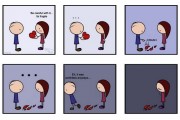Are You Chinese? 你是中国人吗?
China – you know of it, but what do you actually know? You may have been to China, but have you actually been “Chinese”? That is, have you been what Chinese are? Have you done what Chinese do? Have you thought what Chinese think? Have you felt like how Chinese feel?
Are you Chinese? 你是中国人吗?
For example, to talk as Chinese do isn’t as simple as just having the same words that Chinese say come out of your mouth, much the same way to eat as Chinese do isn’t as simple as just putting Chinese food into it. It isn’t what goes in or out of the mouth that identifies it as Chinese, but the mouth itself. It is the mouth, the mouth that is Chinese.
At this time a good question may be to ask “How do I get such a mouth?” but that actually is not a good question; neither is “How do I become Chinese?” since the very act of asking has nullified your intent the very moment you speak it.
You can’t obtain any trait or characteristic of “being Chinese”. You don’t become Chinese. You can’t study abroad or go to a class to have it foisted upon you as a certificate. At its truest and pure, Chinese isn’t biology or DNA, nor a common dream or an ideal, or even a culture or history. To be Chinese is a tradition, a legacy of customs: it is something bequeathed upon you with the weight and expectations of the heavy hearts of a previous, unyielding generation.
It is to be a single hair on a majestic wooly mammoth as it trundles nobly across the barren ice, going going going somewhere. It is from the main trunk that every twig grows from, it is from the vast ocean that every humble tributary draws its strength from, and it is the ancient ready and poised earthbound needle with ambitions to prick the very cheek of the sun, infinitesimally getting incrementally closer with each new successive generation to take up the point.
Simply: China. It was, and it still is. Humans: we are, and then we are not after we die after a life lived. However, to be Chinese is not a classification or subdivision of race or culture – one doesn’t live a life Chinese, but rather one “Sino-phizes” a life by braiding the thread of you into the thick mattress tapestry of Chinese tradition and culture that looms throughout the ages and beyond comprehension itself. One isn’t just Chinese – 5000 thousand years of glorious Chinese culture and history are you.
With an explanation like that, the question “Are you Chinese?” can be shown for what it is: an emphatic accusatory statement. “Are you Chinese?” is not a query or confirmation to find out something because there’s nothing left to learn of someone to which you need to ask this question – by asking aloud it confirms everything there is to know and lines up the fences accordingly.
“Are you Chinese?” is the blunt-force antithesis of “How do I become Chinese?” yet retains its lack of tact as a cross-cultural introduction dysfunction. You, you obviously are not Chinese so as to have me have to ask you such a question, and so therefore you just don’t know/understand/sympathize… follow. You don’t follow the same tradition that Chinese follow. You don’t and so can’t possibly know of the legacy that shapes the Chinese world view and outlines the culture that Chinese partake and consume.
A Chinese says: this is me, I am it. China is great, so by extension I am great; without China I am nothing, and without Chinese there is nothing. This is the house of China that I live in, and unfortunately its windows aren’t big enough to allow outsiders to see the bright, long, smoldering hearth that burns inside, lifting every step, carrying every weight, parrying every knock and landing every blow for us; it rages.
When a Chinese answers by saying “That’s how we do things here,” they mean it and it is a complete answer. They aren’t about to explain the central hub in the grand wheel of tradition that keeps rotating year after year, for how do you explain that which is never explained? How is doing something now that was done before hundreds of years prior and then hundreds of years before that given an explanation? It’s an extenuating, perpetuating concept that yet doesn’t change – the hub keeps revolving year after year to remain in the same place, the same as it always is, as the time and seasons spin around it.
How can something that is defined and fixed in place not be explained? How can the state of “being” be in any way exclusionary? It’s because just as it is physically impossible to occupy the same space as another person, it is impossible to straddle the cultural divide with a foot in two different traditions; the hyphenated multi-cultural multi-flag bearers of different allegiances don’t exist in a place where there is no room to consider them. Whatever you’re supposed to be, you aren’t, and that’s more than enough to begin with to explain this explanation that is never said but always understood.
Are you Chinese? (the question always asked). Is the reason why things are the way they are because they have always been that way? (the question never asked)
“Do you know?”: quite literally (and poorly) translated from the Chinese “你知道吗?” and used liberally by Chinese students of English as the novice speaker’s equivalent of “Have you heard?” – this is the same line drawn in the sand as “Are you Chinese?” with the same pointy stick. Do you know? Well, you should for this isn’t knowledge but a tradition that is both consciously passed down a generation and also unconsciously practiced for every second of every life of every single conscientious Chinese.
Again: do you know? Do you know what is is like to be Chinese? Do you know what it means to be Chinese? Do you know? Are you?
The clear demarcation between “what is Chinese” and “what isn’t” is twinned with the damning assessment that the essence of “Chinese” can’t ever be properly defined, quantified and matriculated serves to make the answer as unanswerable as possible – of course, the question is moot. “Are you Chinese?” Don’t have to answer that, for it already answers itself. “Do you know?” Don’t have to answer that as well, for the question wasn’t asked in the first place. Do you know? Are you Chinese?
The right question isn’t the question that is the most direct or probing or telling: it is the one that elicits a clear answer.
So the answer is: being Chinese is a state of mind that through time has become a consistent state of being that constantly has been in the same state, leaving it for us to state the obvious: the question is moot. While Chinese typical value order and harmony, it is controlled chaos that is the norm because normality isn’t law or rule, or culture or morality — it’s custom. Custom is beyond the scope of values or judgments or reason. The rite of custom is what happens to keep you busy from making other plans. That person is neither good nor bad because he just is, just as you are, and he is just as he ever would have been at any other period, past present or future. That’s the way things are. Why ask why?
“别说怎么回事” – “There is no point to asking why.” There is no point to asking. There is no asking. There is no thinking of asking. There is no thinking of asking because there is no consideration of doing what the asking would entail. See here: if you’re thinking of doing it (or not), then that moment has passed where you could have been it, you could have been being it; you’re too slow to be Chinese, but just barely fast enough to seem like one. The question is moot.
So the answer is: if you have to ask you’ll never know. If your mouth has to object and ask and make itself noticed by being heard, you will never know – you’re already too busy being something else. It’s like with eyes that exist to see something and ears that serve to hear something – busy with “seeing” and “hearing”, where is the “being” in that? To be is not to be asking, there is no question. If you have time to ask why, you’ll never be.
“Are you Chinese?” and “Do you know?” are respective emphatic statements of their own right rather than the literal questions they pose; but coming up with answers to questions and others that were never supposed to be answered in the first place is an ironic paradox that creates further questions—real ones – and creates a problem where none existed in the first place. Meanwhile, customs are followed without hesitancy in a legacy that will never end and, since timeless is with no beginning, also never actually started; it goes.
So, the question is the answer.
The answer is the question.
Do you know?
Are you Chinese?
I am Chinese. I am not Chinese.
That is an answer. I am a question. And thus, logically, because we are talking about the self-contradictory ways of being Chinese, I am the future.





